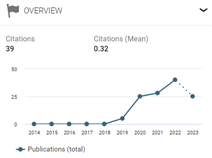Pengaruh pemberian jus kurma (Dactilifera phoenix) pada ibu bersalin kala I terhadap durasi persalinan di wilayah kerja Puskesmas Langsa Baro
DOI: 10.30867/gikes.v1i1.285Abstract
Background: Labor is a physiological process experienced by women through a series of natural processes starting from uterine contractions to be able to give birth to the fetus. Research shows that during normal delivery mothers are still allowed to eat and drink because there is no strong evidence that causes aspiration. Nutrition during labor as an energy source can be obtained from dates (Phoenix Dactilifera). Research shows dates have good nutritional value for carbohydrate-rich bodies and have been shown to influence the progress of labor and increase labor, and reduce postpartum hemorrhage.
Objective: to prove whether there is an effect of the administration of date palm juice (Dactilifera Phoenix) to first-time mothers on the duration of labor in the Langsa Baro Health Center.
Method: This research is a quasi experiment with a nonequivalent posttest only control group design approach. This research was conducted in the Work Area of the Langsa Baro Health Center from July 11 to September 22 2017 with the place of delivery in the Polindes. The number of samples for each group was 15 people in the intervention group and 15 people in the control group. To avoid drop outs, the number of samples is added by 10% (2 people) so that each group is 17 people. Data analysis Data normality test uses the Shapiro-Wilk test and Parametric Test uses the Independent T-Test for normal distribution data to look for differences in the average of the control group with treatment.
Results: The results of the study with the data normality test with the Shapiro-Wilk test showed that the duration of labor in the two groups had a p-value of 0.247 (p> 0.05) meaning that the data were normally distributed. And the Independent T-Test shows the difference in the average duration of labor in the two groups. In the control group the average duration of labor was 12.09 while in the treatment group it was 11.23, showing no significant difference in the mean values in the two groups with p-value = 0.011. This shows that statistically the administration of date palm juice cannot accelerate the duration of labor.
Conclusion: There were differences in the average duration of labor in the control and treatment groups. In the control group the average duration of labor was 12.09 hours and the treatment group was 11.23 hours. And the date palm juice did not significantly speed up the duration of labor (p-value = 0.011).Keywords
Full Text:
PDFReferences
Abalos, E., Oladapo, O. T., Chamillard, M., Díaz, V., Pasquale, J., Bonet, M., Souza, J. P., & Gülmezoglu, A. M. (2018). Duration of spontaneous labour in ‘low-risk’women with ‘normal’perinatal outcomes: A systematic review. European Journal of Obstetrics & Gynecology and Reproductive Biology, 223, 123–132.
Al-Kuran, O., Al-Mehaisen, L., Bawadi, H., Beitawi, S., & Amarin, Z. (2011). The effect of late pregnancy consumption of date fruit on labour and delivery. Journal of Obstetrics and Gynaecology, 31(1), 29–31. https://doi.org/10.3109/01443615.2010.522267
Al-Olaimat, H. H. (2007). Maternal Energy During Labor Intrapartum Nutrition and Nourishment: A Clinical Study. JU Journals Portal, 41(2), 75–79.
El-Sohaimy, S. A., & Hafez, E. E. (2010). Biochemical and nutritional characterizations of date palm fruits (Phoenix dactylifera L.). J Appl Sci Res, 6(6), 1060–1067.
Khotimah, S., & Sari, E. N. (2018). Analisis Perbedaan Partisipasi Suami dan Tenaga Kesehatan terhadap Tingkat Kecemasan Ibu Intrapartum Primipara. Journal for Quality in Women’s Health, 1(2), 50–56.
Kordi, M., Aghaei Meybodi, F., Tara, F., Nemati, M., & Taghi Shakeri, M. (2014). The effect of late pregnancy consumption of date fruit on cervical ripening in nulliparous women. Journal of Midwifery and Reproductive Health, 2(3), 150–156. https://doi.org/0.22038/jmrh.2014.2772
Parvin, S., Easmin, D., Sheikh, A., Biswas, M., Sharma, S. C. D., Jahan, M. G. S., Islam, M. A., Shovon, M. S., & Roy, N. (2015). Nutritional analysis of date fruits (Phoenix dactylifera L.) in perspective of Bangladesh. American Journal of Life Sciences, 3(4), 274–278. https://doi.org/10.11648/j.ajls.20150304.14
Patriajati, S., & Sriatmi, A. (2019). Determinants of mothers’participation in antenatal classes. Jurnal Administrasi Kesehatan Indonesia, 7(2), 139–146.
Rahmani, R., Khakbazan, Z., Yavari, P., Granmayeh, M., & Yavari, L. (2012). Effect of oral carbohydrate intake on labor progress: randomized controlled trial. Iranian Journal of Public Health, 41(11), 59.
Rayburn, W. F., & Carey, J. C. (2006). Obstetri & Ginekologi. Penerbit Buku Kedokteran (EGC). http://r2kn.litbang.kemkes.go.id:8080/xmlui/handle/123456789/76904
Saryono, M., & Rahmawati, E. (2016). Effects of dates fruit (phoenix dactylifera l.) in the female reproductive process. International J of Recent Advances in Multidisciplinary Res, 3(7), 1630–1633.
Sulistyawati, A. (2010). Asuhan Kebidanan Pada Ibu Bersalin. Salemba Medika.
Suroso, S., & Paryono, P. (2016). Pengaruh konsumsi sari kurma pada akhir kehamilan terhadap kemajuan persalinan Kala I dan jumlah perdarahan saat persalinan pada primipara di wilayah kerja Puskesmas Klaten Selatan. Interest: Jurnal Ilmu Kesehatan, 5(1), 41–45.
Refbacks
- There are currently no refbacks.














